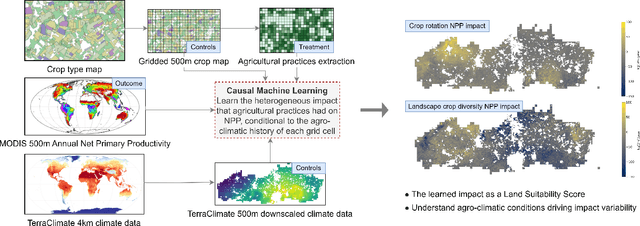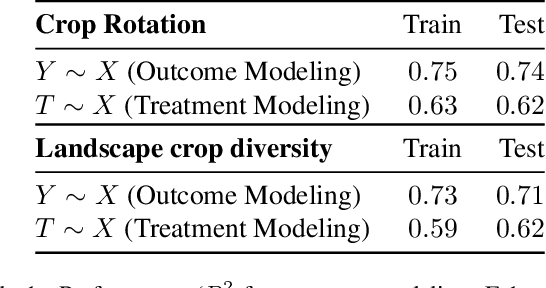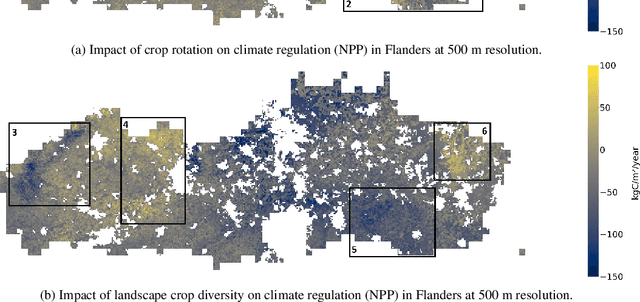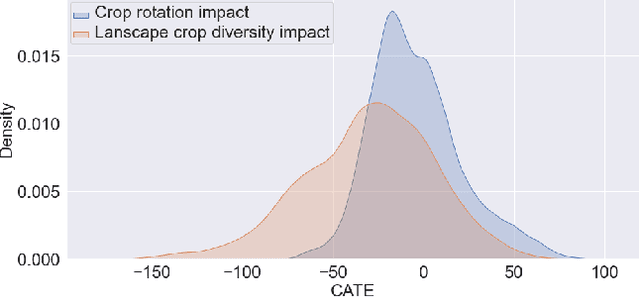Georgios Giannarakis
Causality and Explainability for Trustworthy Integrated Pest Management
Dec 07, 2023



Abstract:Pesticides serve as a common tool in agricultural pest control but significantly contribute to the climate crisis. To combat this, Integrated Pest Management (IPM) stands as a climate-smart alternative. Despite its potential, IPM faces low adoption rates due to farmers' skepticism about its effectiveness. To address this challenge, we introduce an advanced data analysis framework tailored to enhance IPM adoption. Our framework provides i) robust pest population predictions across diverse environments with invariant and causal learning, ii) interpretable pest presence predictions using transparent models, iii) actionable advice through counterfactual explanations for in-season IPM interventions, iv) field-specific treatment effect estimations, and v) assessments of the effectiveness of our advice using causal inference. By incorporating these features, our framework aims to alleviate skepticism and encourage wider adoption of IPM practices among farmers.
Understanding the impacts of crop diversification in the context of climate change: a machine learning approach
Jul 17, 2023



Abstract:The concept of sustainable intensification in agriculture necessitates the implementation of management practices that prioritize sustainability without compromising productivity. However, the effects of such practices are known to depend on environmental conditions, and are therefore expected to change as a result of a changing climate. We study the impact of crop diversification on productivity in the context of climate change. We leverage heterogeneous Earth Observation data and contribute a data-driven approach based on causal machine learning for understanding how crop diversification impacts may change in the future. We apply this method to the country of Cyprus throughout a 4-year period. We find that, on average, crop diversification significantly benefited the net primary productivity of crops, increasing it by 2.8%. The effect generally synergized well with higher maximum temperatures and lower soil moistures. In a warmer and more drought-prone climate, we conclude that crop diversification exhibits promising adaptation potential and is thus a sensible policy choice with regards to agricultural productivity for present and future.
Evaluating Digital Agriculture Recommendations with Causal Inference
Nov 30, 2022



Abstract:In contrast to the rapid digitalization of several industries, agriculture suffers from low adoption of smart farming tools. While AI-driven digital agriculture tools can offer high-performing predictive functionalities, they lack tangible quantitative evidence on their benefits to the farmers. Field experiments can derive such evidence, but are often costly, time consuming and hence limited in scope and scale of application. To this end, we propose an observational causal inference framework for the empirical evaluation of the impact of digital tools on target farm performance indicators (e.g., yield in this case). This way, we can increase farmers' trust via enhancing the transparency of the digital agriculture market and accelerate the adoption of technologies that aim to secure farmer income resilience and global agricultural sustainability. As a case study, we designed and implemented a recommendation system for the optimal sowing time of cotton based on numerical weather predictions, which was used by a farmers' cooperative during the growing season of 2021. We then leverage agricultural knowledge, collected yield data, and environmental information to develop a causal graph of the farm system. Using the back-door criterion, we identify the impact of sowing recommendations on the yield and subsequently estimate it using linear regression, matching, inverse propensity score weighting and meta-learners. The results reveal that a field sown according to our recommendations exhibited a statistically significant yield increase that ranged from 12% to 17%, depending on the method. The effect estimates were robust, as indicated by the agreement among the estimation methods and four successful refutation tests. We argue that this approach can be implemented for decision support systems of other fields, extending their evaluation beyond a performance assessment of internal functionalities.
Evaluating Digital Tools for Sustainable Agriculture using Causal Inference
Nov 06, 2022



Abstract:In contrast to the rapid digitalization of several industries, agriculture suffers from low adoption of climate-smart farming tools. Even though AI-driven digital agriculture can offer high-performing predictive functionalities, it lacks tangible quantitative evidence on its benefits to the farmers. Field experiments can derive such evidence, but are often costly and time consuming. To this end, we propose an observational causal inference framework for the empirical evaluation of the impact of digital tools on target farm performance indicators. This way, we can increase farmers' trust by enhancing the transparency of the digital agriculture market, and in turn accelerate the adoption of technologies that aim to increase productivity and secure a sustainable and resilient agriculture against a changing climate. As a case study, we perform an empirical evaluation of a recommendation system for optimal cotton sowing, which was used by a farmers' cooperative during the growing season of 2021. We leverage agricultural knowledge to develop a causal graph of the farm system, we use the back-door criterion to identify the impact of recommendations on the yield and subsequently estimate it using several methods on observational data. The results show that a field sown according to our recommendations enjoyed a significant increase in yield (12% to 17%).
Personalizing Sustainable Agriculture with Causal Machine Learning
Nov 06, 2022Abstract:To fight climate change and accommodate the increasing population, global crop production has to be strengthened. To achieve the "sustainable intensification" of agriculture, transforming it from carbon emitter to carbon sink is a priority, and understanding the environmental impact of agricultural management practices is a fundamental prerequisite to that. At the same time, the global agricultural landscape is deeply heterogeneous, with differences in climate, soil, and land use inducing variations in how agricultural systems respond to farmer actions. The "personalization" of sustainable agriculture with the provision of locally adapted management advice is thus a necessary condition for the efficient uplift of green metrics, and an integral development in imminent policies. Here, we formulate personalized sustainable agriculture as a Conditional Average Treatment Effect estimation task and use Causal Machine Learning for tackling it. Leveraging climate data, land use information and employing Double Machine Learning, we estimate the heterogeneous effect of sustainable practices on the field-level Soil Organic Carbon content in Lithuania. We thus provide a data-driven perspective for targeting sustainable practices and effectively expanding the global carbon sink.
Towards assessing agricultural land suitability with causal machine learning
Apr 27, 2022



Abstract:Understanding the suitability of agricultural land for applying specific management practices is of great importance for sustainable and resilient agriculture against climate change. Recent developments in the field of causal machine learning enable the estimation of intervention impacts on an outcome of interest, for samples described by a set of observed characteristics. We introduce an extensible data-driven framework that leverages earth observations and frames agricultural land suitability as a geospatial impact assessment problem, where the estimated effects of agricultural practices on agroecosystems serve as a land suitability score and guide decision making. We formulate this as a causal machine learning task and discuss how this approach can be used for agricultural planning in a changing climate. Specifically, we extract the agricultural management practices of "crop rotation" and "landscape crop diversity" from crop type maps, account for climate and land use data, and use double machine learning to estimate their heterogeneous effect on Net Primary Productivity (NPP), within the Flanders region of Belgium from 2010 to 2020. We find that the effect of crop rotation was insignificant, while landscape crop diversity had a small negative effect on NPP. Finally, we observe considerable effect heterogeneity in space for both practices and analyze it.
 Add to Chrome
Add to Chrome Add to Firefox
Add to Firefox Add to Edge
Add to Edge